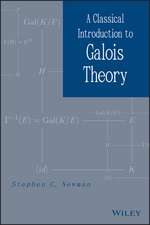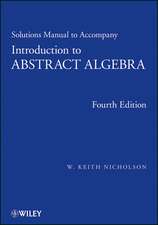Introduction to the Representation Theory of Algebras
Autor Michael Baroten Limba Engleză Paperback – 14 ian 2015
Each section includes exercises to facilitate understanding. By keeping the proofs as basic and comprehensible as possible and introducing the three languages at the beginning, this book is suitable for readers from the advanced undergraduate level onwards and enables them to consult related, specific research articles.
Preț: 315.77 lei
Nou
Puncte Express: 474
Preț estimativ în valută:
60.42€ • 63.25$ • 50.29£
60.42€ • 63.25$ • 50.29£
Carte tipărită la comandă
Livrare economică 31 martie-14 aprilie
Preluare comenzi: 021 569.72.76
Specificații
ISBN-13: 9783319114743
ISBN-10: 3319114743
Pagini: 190
Ilustrații: X, 179 p. 109 illus.
Dimensiuni: 155 x 235 x 14 mm
Greutate: 0.28 kg
Ediția:2015
Editura: Springer International Publishing
Colecția Springer
Locul publicării:Cham, Switzerland
ISBN-10: 3319114743
Pagini: 190
Ilustrații: X, 179 p. 109 illus.
Dimensiuni: 155 x 235 x 14 mm
Greutate: 0.28 kg
Ediția:2015
Editura: Springer International Publishing
Colecția Springer
Locul publicării:Cham, Switzerland
Public țintă
Upper undergraduateCuprins
Matrix Problems.- Representations of Quivers.- Algebras.- Module Categories.- Elements of Homological Algebra.- The Auslander-Reiten Theory.- Knitting.- Combinatorial Invariants.- Indecomposables and Dimensions.
Recenzii
“This book is a short and elementary course in the representation theory of finite dimensional algebras. It may be a good text book for undergraduate and PhD students, because only the knowledge of linear algebra is required.” (Justyna Kosakowska, zbMATH 1330.16001, 2016)
“Barot (former researcher, Instituto de Matemáticas, Univ. Nacional Autónoma de México) paints the big picture and emphasizes recent perspectives. … An advanced undergraduate could read this book as a wonderful case study in the power of shifting viewpoints and thus an initiation into the modern practice of mathematics. … Summing Up: Highly recommended. Lower- and upper-division undergraduates, graduate students, researchers/faculty, and professionals/practitioners.” (D. V. Feldman, Choice, Vol. 53 (4), December, 2015)
“The book gives a first introduction to the representation theory of finite-dimensional algebras over an algebraically closed field. … With its well-chosen topics, arranged in a smooth and attractive order, the book is highly recommended as a one-semester introductory course on representations of finite-dimensional algebras.” (Wolfgang Rump, Mathematical Reviews, October, 2015)
“Barot (former researcher, Instituto de Matemáticas, Univ. Nacional Autónoma de México) paints the big picture and emphasizes recent perspectives. … An advanced undergraduate could read this book as a wonderful case study in the power of shifting viewpoints and thus an initiation into the modern practice of mathematics. … Summing Up: Highly recommended. Lower- and upper-division undergraduates, graduate students, researchers/faculty, and professionals/practitioners.” (D. V. Feldman, Choice, Vol. 53 (4), December, 2015)
“The book gives a first introduction to the representation theory of finite-dimensional algebras over an algebraically closed field. … With its well-chosen topics, arranged in a smooth and attractive order, the book is highly recommended as a one-semester introductory course on representations of finite-dimensional algebras.” (Wolfgang Rump, Mathematical Reviews, October, 2015)
Notă biografică
Michael Barot was a researcher at the Instituto de Matemáticas of the Universidad Nacional Autónoma de México.
Textul de pe ultima copertă
This book gives a general introduction to the theory of representations of algebras. It starts with examples of classification problems of matrices under linear transformations and explains the three common setups: representation of quivers, modules over algebras and additive functors over certain categories. The main part is devoted to (i) module categories, presenting the unicity of the decomposition into indecomposable modules, the Auslander–Reiten theory and the technique of knitting; (ii) the use of combinatorial tools such as dimension vectors and integral quadratic forms; and (iii) deeper theorems such as Gabriel‘s Theorem, the trichotomy and the Theorem of Kac – all accompanied by further examples.
Each section includes exercises to facilitate understanding. By keeping the proofs as basic and comprehensible as possible and introducing the three languages at the beginning, this book is suitable for readers from the advanced undergraduate level onwards and enables them to consult related, specific research articles.
Each section includes exercises to facilitate understanding. By keeping the proofs as basic and comprehensible as possible and introducing the three languages at the beginning, this book is suitable for readers from the advanced undergraduate level onwards and enables them to consult related, specific research articles.
Caracteristici
A down-to-earth approach to the subject Introduces all established descriptions within the field Provides detailed and comprehensible proofs for all statements Contains numerous exercises within the chapters Includes supplementary material: sn.pub/extras











